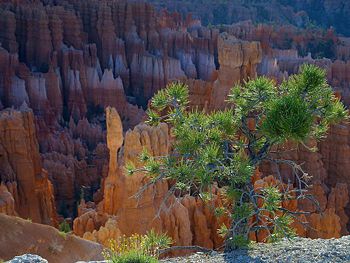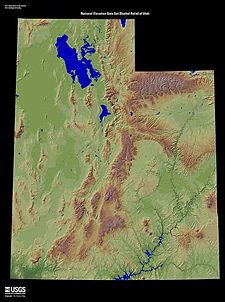Utah (U.S. state)
Utah is a state in the western portion of the United States. It was admitted into the Union in 1896. The U.S. Congress refused Utah's application to become a state for four decades until, in 1890, the Mormon church renounced polygamy.[1]
Salt Lake City is the capital and the largest city.
History
Utah was originally the settlement of Mormon migrants, led by Brigham Young, who fled from Illinois (U.S. state). Between 1857 and 1858, the U.S. government under President James Buchanan conducted expeditions into Utah, in the conflict known today as the Utah War. Eventually, the U.S. forces defeated Utahan troops and subjugated the territory.
Politics
Utah is one of the most conservative states in the United States, both economically and socially. The Republican Party dominates state politics. As of 2023, Spencer J. Cox is the governor of Utah. Mitt Romney and Mike Lee, both Republicans, represent the state in the U.S. Senate. Provo, Utah is one of the most conservative cities in the nation. Demographics are changing in the Salt Lake City municipality, and there have been Democrats and more liberal officials elected to office there in the 21st century.
Geography
Utah is known for its natural diversity and is home to features ranging from arid deserts with sand dunes to pine forests in mountain valleys. It is a state at the convergence of three distinct geological regions: the Rocky Mountains, the Great Basin, and the Colorado Plateau.
Utah covers an area of 84,899 sq mi (219,890 sq km). It is one of the Four Corners states and is bordered by Idaho in the north, Wyoming in the north and east, Colorado in the east, at a single point by New Mexico to the southeast, Arizona to the south, and Nevada to the west. It is one of only three U.S. states (Utah, Colorado, and Wyoming) exclusively define by latitude and longitude lines.
The state features several mountain ranges. Running down the middle of the state's northern third is the Wasatch Range, which rises to heights of almost 12,000 ft (3,700 m) above sea level. Utah is home to world-renowned ski resorts made popular by light, fluffy snow. In the state's northeastern section, running east to west, are the Uinta Mountains, which rise to heights of over 13,000 feet. The highest point in the state is Kings Peak, at 13,528 feet, within the Uinta Mountains.
At the western base of the Wasatch Range is the Wasatch Front, a series of valleys and basins home to the most populous parts of the state. It stretches approximately from Brigham City at the north end to Nephi at the south end. Approximately 75 percent of the state's population lives in this corridor, and population growth is rapid. Because of this concentration of human population, the state is said to be the most urbanized of all states.
Education
Prominent institutions of higher education in Utah include Brigham Young University, affiliated with the Church of Jesus Christ of Latter-day Saints (Mormon Church), and the University of Utah.
The Morgan Quitno Press ranks Utah the 33rd in education quality among U.S. states during 2005-2006 school year.[2]
See also
References
- ↑ The Mormons: The Path to Utah Statehood , American Experience, PBS, last access 7/3/2023
- ↑ 2005-2006 Smartest State Award, Morgan Quitno Press

